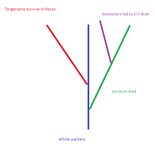- Messages
- 9,441
The last few remarks made by him about the Winds of Winder have been about two years of almost no progress, and saying he's really struggling with finishing it, to most recently expressing worries about not being able to finish before he dies. It's been over a decade since Dance with Dragons. So what gives?
Well, I might be able to offer some insight, as I've been aspiring to write my own fantasy series. I've had the idea since I was still in high school about twenty five years ago. When covid happened, I finally felt motivated to put in real and serious work on it, so I've spent the last three or four years researching and studying the craft, reading books on writing fiction, and I'm about a third of the way into writing only the first draft of the third book in my planned trilogy.
I know, I know. What has that to do with G.R.R.Martin? Well, I can share with yall some things I've learned about writing these types of books, both from my personal experiences and what I've read from the opinions of lots of different famous authors on the subject, and combine that with the statements Martin himself has made.
First major point: everyone is different, and authors are no exception. They all fall somewhere on a spectrum. On one extreme end of that spectrum are the architects: they have the book (or books) all planned out before they even write any of it. They have an outline with varying degrees of detail. Changes and new details may come to them as they write and revise, but they have a pretty solid idea of where they're going with it as well as the path to get there. The other extreme end of the spectrum are the gardeners: they don't really have a plan, or at most a very vague sense of a possible ending, but for the most part they have an idea that intrigues them and they just start writing and see where it takes them.
Stephen King is probably the most famous example of the gardener type. Before he had completed his Dark Tower series, he had fans asking him how it's going to end because they were going to die soon. One was an old woman with failing health, another was a man on death row. And he had to tell each of them that unfortunately he can't do that for them even if he wants to, because he doesn't know the ending. In his book "On Writing", he likens the process to being an archeologist that's excavating a skeleton or an ancient piece of pottery: the author doesn't know what they're going to unearth beneath the surface until they spend some time chiseling away at it.
I myself am probably a hybrid of both types, but probably fall a lot more heavily on the architect end of the spectrum. It has its advantages and disadvantages: I'm much less prone to writers block, but at a cost because I feel that I will never have as powerful a voice or imagination as some of the greats, the majority of whom fall more on the gardener side of things.
In a recent interview, Martin described himself as the gardener type. That explains both the brilliance of his work, and also the corner he's written himself into.
So that brings us to the second major point: the scope of the story has become too broad to manage and keep track of. Think about the sizes of the books as they progress. Book two was bigger than book one. Book three was HUGE. And then the next two books were originally going to be one book but he had to split it into two volumes because it really had become that massive (and even after doing so, Dance with Dragons was almost as big as Storm of Swords).
I know I'm an unproven, unpublished amateur, and I'm not trying to compare myself to them in that way. But I am serious about writing these books and have put in real work on them over three or four years now and have the first drafts of two books complete. Martin has five out of seven books written, and a gap of 13 years (and growing) between now when Dance with Dragons released. And despite my much smaller scale and timeline, with meticulous notes in Evernote to refer back to, I still find myself having to keep track of all my various plots and subplots. And when I go back to review an earlier chapter from book 1 or even book 2, I'm surprised to realize just how many minor or minor-ish characters that I completely forgot about and have been quietly absent from the story (but hey, that's what the revision process is for).
Now take A Song of Ice and Fire. I'll try to illustrate my point. Here's the beginning of A Game of Thrones, beginning a branching plot tree with new plots constantly splitting off or entering the story.

Starts out simple. But every new character and development is another thing to keep track of. ASoIaF had seven kingdoms. Each kingdom has dozens of family names. Each family name has dozens of individual names, and relations between them. And not just in present time, but also the histories going back hundreds or even thousands of years. And that's just Westeros, there's still Essos and a few other island nations to keep track of. Every character has an age, a physical description, a personality, a relation with other characters in the story, their own motivations, and so on. And with each book he just makes more and more. For every plot line that gets resolved, two or three new ones develop. So that by Dance with Dragons, the plot tree looks more similar to this:

So by the end of the seventh book, it'll probably look even worse than this:

What's my point? I guess only to try to shed some light on it, and also help others to understand just why it's taking so long for him to finish and how the work has really got away from him, to the point where he'd rather make shows and prequels because he has such a behemoth on his hands and unless you actually attempt to write something, it's hard to accurately appreciate just what a daunting task it is.
Well, I might be able to offer some insight, as I've been aspiring to write my own fantasy series. I've had the idea since I was still in high school about twenty five years ago. When covid happened, I finally felt motivated to put in real and serious work on it, so I've spent the last three or four years researching and studying the craft, reading books on writing fiction, and I'm about a third of the way into writing only the first draft of the third book in my planned trilogy.
I know, I know. What has that to do with G.R.R.Martin? Well, I can share with yall some things I've learned about writing these types of books, both from my personal experiences and what I've read from the opinions of lots of different famous authors on the subject, and combine that with the statements Martin himself has made.
First major point: everyone is different, and authors are no exception. They all fall somewhere on a spectrum. On one extreme end of that spectrum are the architects: they have the book (or books) all planned out before they even write any of it. They have an outline with varying degrees of detail. Changes and new details may come to them as they write and revise, but they have a pretty solid idea of where they're going with it as well as the path to get there. The other extreme end of the spectrum are the gardeners: they don't really have a plan, or at most a very vague sense of a possible ending, but for the most part they have an idea that intrigues them and they just start writing and see where it takes them.
Stephen King is probably the most famous example of the gardener type. Before he had completed his Dark Tower series, he had fans asking him how it's going to end because they were going to die soon. One was an old woman with failing health, another was a man on death row. And he had to tell each of them that unfortunately he can't do that for them even if he wants to, because he doesn't know the ending. In his book "On Writing", he likens the process to being an archeologist that's excavating a skeleton or an ancient piece of pottery: the author doesn't know what they're going to unearth beneath the surface until they spend some time chiseling away at it.
I myself am probably a hybrid of both types, but probably fall a lot more heavily on the architect end of the spectrum. It has its advantages and disadvantages: I'm much less prone to writers block, but at a cost because I feel that I will never have as powerful a voice or imagination as some of the greats, the majority of whom fall more on the gardener side of things.
In a recent interview, Martin described himself as the gardener type. That explains both the brilliance of his work, and also the corner he's written himself into.
So that brings us to the second major point: the scope of the story has become too broad to manage and keep track of. Think about the sizes of the books as they progress. Book two was bigger than book one. Book three was HUGE. And then the next two books were originally going to be one book but he had to split it into two volumes because it really had become that massive (and even after doing so, Dance with Dragons was almost as big as Storm of Swords).
I know I'm an unproven, unpublished amateur, and I'm not trying to compare myself to them in that way. But I am serious about writing these books and have put in real work on them over three or four years now and have the first drafts of two books complete. Martin has five out of seven books written, and a gap of 13 years (and growing) between now when Dance with Dragons released. And despite my much smaller scale and timeline, with meticulous notes in Evernote to refer back to, I still find myself having to keep track of all my various plots and subplots. And when I go back to review an earlier chapter from book 1 or even book 2, I'm surprised to realize just how many minor or minor-ish characters that I completely forgot about and have been quietly absent from the story (but hey, that's what the revision process is for).
Now take A Song of Ice and Fire. I'll try to illustrate my point. Here's the beginning of A Game of Thrones, beginning a branching plot tree with new plots constantly splitting off or entering the story.

Starts out simple. But every new character and development is another thing to keep track of. ASoIaF had seven kingdoms. Each kingdom has dozens of family names. Each family name has dozens of individual names, and relations between them. And not just in present time, but also the histories going back hundreds or even thousands of years. And that's just Westeros, there's still Essos and a few other island nations to keep track of. Every character has an age, a physical description, a personality, a relation with other characters in the story, their own motivations, and so on. And with each book he just makes more and more. For every plot line that gets resolved, two or three new ones develop. So that by Dance with Dragons, the plot tree looks more similar to this:

So by the end of the seventh book, it'll probably look even worse than this:

What's my point? I guess only to try to shed some light on it, and also help others to understand just why it's taking so long for him to finish and how the work has really got away from him, to the point where he'd rather make shows and prequels because he has such a behemoth on his hands and unless you actually attempt to write something, it's hard to accurately appreciate just what a daunting task it is.





